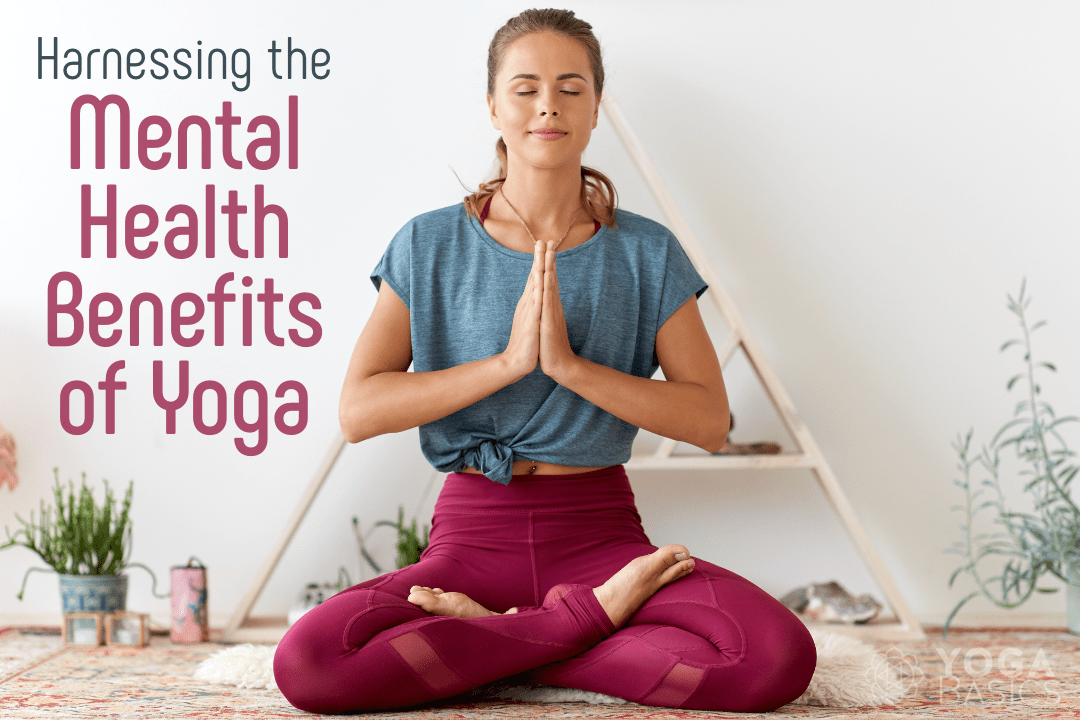
With the rise in mental health issues such as depression, anxiety, and post-traumatic stress disorder, more and more people are turning to yoga as a natural and holistic approach to improving their mental state and emotional health. Through mindful movements, controlled breathing, meditation, and relaxation techniques, yoga has been shown to cultivate self-awareness, regulate emotions, reduce stress levels, boost resilience, increase inner peace, and improve mental clarity. The practice of yoga also promotes a sense of connection between the mind, body, and spirit, fostering a deep sense of inner harmony and balance. Incorporating as little as 15 minutes of yoga into a regular self-care routine can have a profound impact on one’s mental well-being.
The Mental Health Benefits of Yoga
Yoga has been practiced for centuries and is revered for its ability to promote physical health, flexibility, and strength. However, in recent years, researchers have begun to explore the mental health benefits of yoga as well. One of the key ways that yoga can benefit mental health is through its focus on mindfulness. Mindfulness is the practice of being fully present and aware in the moment, without judgment. This can help individuals with mental health concerns to better manage their thoughts and emotions, leading to improved stress management and emotional regulation. Here are some additional ways in which yoga can harness mental health benefits:
Increase self-awareness and mindfulness
One of the key benefits of practicing yoga is the increased self-awareness and mindfulness that it cultivates. Through the combination of physical postures, controlled breathing, and meditation, yoga creates a space for individuals to connect with their bodies, thoughts, and emotions on a deeper level. By focusing on the present moment and tuning into bodily sensations, yoga practitioners develop a heightened sense of self-awareness. This increased awareness allows individuals to identify and understand their thoughts patterns, emotional triggers, and physical sensations, leading to a greater understanding of themselves and their overall well-being. Furthermore, the mindfulness cultivated through yoga encourages individuals to approach each moment with intention, non-judgment, and acceptance, promoting a sense of inner calm and mental clarity.
Improve overall mood and well-being
Yoga has been shown to have a significant impact on emotional regulation, and can greatly improve mood and overall mental well-being. Regular practice of yoga has been linked to a reduction in symptoms of anxiety and depression, as well as an increase in feelings of happiness and contentment. This can be attributed to the combination of physical movement, controlled breathing, and meditation that yoga incorporates. The physical postures and stretches release tension in the body, promoting relaxation and a sense of physical well-being. The controlled breathing exercises help to calm the nervous system and reduce stress. Additionally, the practice of meditation during yoga allows individuals to quiet the mind, bring focus to the present moment, cultivate a positive outlook on life, and develop a sense of inner peace.
Reduce symptoms of anxiety
Many individuals experience feelings of anxiety because of various factors, such as stress, work pressure, or personal challenges. Engaging in regular yoga practice can help alleviate these symptoms by promoting relaxation and reducing the body’s stress response. Through the combination of calming postures, controlled breathing techniques, and meditation, yoga provides a holistic approach to managing anxiety. The physical movements and stretches release tension from the body, while deep and intentional breathing exercises calm the nervous system. The practice of meditation plays a key role for individuals to cultivate a sense of inner peace and mindfulness, enabling them to better cope with anxious thoughts and emotions.
Strengthen mind-body connection
Yoga encourages individuals to become more aware of their bodies, thoughts, and emotions, fostering a stronger connection and unity between the mind and the body. Through mindful movement and intentional breathing, yoga practitioners develop a heightened sense of body awareness, allowing them to better understand and respond to the signals and needs of their bodies. This increased self-awareness extends beyond the yoga mat and into daily life, enabling individuals to make more conscious choices that support their overall well-being. By strengthening the mind-body connection, yoga empowers individuals to cultivate a deeper understanding of themselves and their needs, leading to improved mental clarity, emotional resilience, and a greater sense of balance and harmony in their lives.
Promote relaxation and stress management
The combination of gentle movements, breath control, and mindfulness practices creates a calming and soothing effect on the nervous system. As individuals engage in asanas or postures, they release physical tension and tightness, allowing their bodies to relax deeply. The intentional and rhythmic breathing techniques utilized in yoga activate the body’s relaxation response, reducing the production of stress hormones and promoting a sense of calm and tranquility. The focus on present moment awareness and the cultivation of a non-judgmental mindset during yoga practice help individuals let go of worries, anxieties, and racing thoughts, fostering a state of mental relaxation and emotional well-being.
Boost self-esteem and confidence
Through the combination of mindfulness, discernment, and self-acceptance, yoga provides individuals with a unique opportunity to cultivate a positive body image and a deeper sense of self-worth. The gentle and non-competitive nature of yoga encourages individuals to focus on their own progress and growth, rather than comparing themselves to others. As individuals learn to listen to their bodies and honor their capabilities, they begin to appreciate and celebrate their own unique strengths and abilities, fostering a sense of self-confidence and empowerment. Additionally, the practice of self-compassion and self-acceptance in yoga allows individuals to let go of negative self-judgments and embrace a more positive and nurturing relationship with themselves. By developing a strong sense of self-esteem and confidence through yoga, individuals can experience greater resilience, assertiveness, and overall well-being in their daily lives.
Enhance cognitive function and focus
A regular yoga practice has been found to enhance cognitive function and focus, providing mental health benefits that extend beyond the physical aspects of the practice. The combination of physical postures, controlled breathing techniques, and mindfulness exercises has been shown to increase the production of neurotransmitters such as dopamine and serotonin, which regulates mood and enhancing cognitive function. Additionally, the focus and concentration required during yoga practice can improve attention span, mental clarity, and memory recall.
Cultivate inner peace
The intentional and controlled movements in yoga encourage the release of tension and stress from the body, while the practice of deep breathing promotes relaxation and activates the body’s natural relaxation response. By incorporating regular yoga practice into their lives, individuals can develop a heightened awareness of their thoughts and emotions, allowing them to embrace a calm and centered state of being. This sense of calmness not only promotes mental wellbeing but also fosters a greater sense of overall balance and harmony in one’s life.
Improve sleep quality
Many people struggle with sleep disturbances because of stress and anxiety. Yoga can help promote relaxation and improve sleep quality by calming the mind and reducing tension in the body. There are specific poses, breathing exercises, and meditation techniques that can be used before bedtime to help induce a state of calm and ease that can lead to a more restful night’s sleep.
Support recovery from addiction
Addiction is a complex condition where compulsive substance use impacts mental well-being and exacerbates disorders like anxiety and depression. For those struggling with addiction, incorporating yoga into their recovery journey can be particularly beneficial. Yoga can help individuals cope with cravings, manage triggers, and develop healthier coping mechanisms. Additionally, the sense of community and support that can be found in yoga classes can help individuals feel less isolated and more connected to others.
Yoga is not a cure-all for addiction, but when combined with professional treatment and support, it can be a valuable component of a holistic recovery plan. By promoting physical, emotional, and mental well-being, yoga can help individuals break free from the cycle of addiction and improve their overall quality of life. It is important for individuals to explore addiction resources and seek guidance from qualified professionals to create a personalized plan that addresses their unique needs and challenges.
Tips for Getting Mental Health Benefits from Yoga
- Have a Regular Practice
Being consistent is important for getting long-term mental health benefits from yoga. Try to make yoga a part of your routine, even if it’s just a short session every day. As you build this habit, it will become something reliable that helps you deal with life’s challenges more easily. - Include Mindfulness and Meditation
While the physical poses are helpful, adding mindfulness and meditation to your sessions can boost the mental health benefits even more. As you move through the poses, consciously focus on your breathing and how your body feels. Being aware in the present moment helps quiet your mind and reduce stress. - Set an Intention for Practice
Before each yoga session, take a moment to set an intention or specific goal. This simple act deepens the connection between your mind and body. It allows you to approach the practice with more purpose and focus. Your intention could be something like “cultivating peace” or “releasing tension.” - Try Different Types of Yoga
Yoga has many diverse styles, each with its own benefits. Try out different styles to find the one that works best for your mental health needs. For example, restorative and Hatha yoga are great for relaxation, Iyengar yoga builds focus and physical awareness, while more active styles like Vinyasa and Ashtanga can give you an energy boost. - Create a Yoga Space at Home
Set aside a calming, comfortable yoga studio in your home just for your practice. Having this dedicated area can enhance the overall experience and promote a sense of relaxation for your mind. You can add candles, nice smells, or inspiring quotes to create an atmosphere that nurtures your well-being. - Practice with a Group
While practicing alone is helpful, joining yoga classes or groups offers extra mental health advantages. The shared energy and community feeling can be uplifting and motivating. It provides a supportive environment for personal growth. - Practice Outside
Whenever you can, take your yoga practice outdoors and spend time in nature. Being in natural surroundings can increase the mental health benefits of yoga. It helps you feel more connected to the world and promotes a sense of grounding and inner peace. - Focus on Yogic Breathing Exercises
Breath control practices, called pranayama, are an important part of yoga. Learning to regulate your breathing can significantly impact your mental state by reducing anxiety and promoting calmness. Add simple breathing exercises to your practice to experience the positive effects on your mind. - Live a Yogic Lifestyle
The yoga poses are beneficial. However, fully embracing yoga as a lifestyle can greatly impact your mental well-being. Incorporate yogic principles and philosophies into your daily life. For example, practice mindful eating, get enough sleep, and practice the yamas and niyamas. - Learn from Experienced Instructors
Taking guidance from a certified, experienced yoga teacher ensures you practice safely and effectively. They can teach you proper form, offer modifications for any physical limitations, and share valuable insights into the mental and spiritual aspects of yoga.
Disclaimer
While yoga can be a valuable complement to traditional mental health treatments, it is not a replacement for professional therapy or medication. Always consult with a healthcare provider before starting any new exercise or wellness routine. If you are suffering from a mental health disorder such as depression, anxiety, or PTSD, it is crucial to seek the guidance of a qualified mental health professional who can provide a comprehensive treatment plan tailored to your specific needs.
Final thoughts
Incorporating yoga into your routine can greatly benefit your well-being and overall health. Establishing a practice of exploring yoga styles and embracing mindfulness will help cultivate inner resilience. Keep in mind that this journey is uniquely yours. Approach it with patience, commitment, and an open heart. Embrace the power of yoga as you embark on a path toward greater peace, clarity, and happiness.





